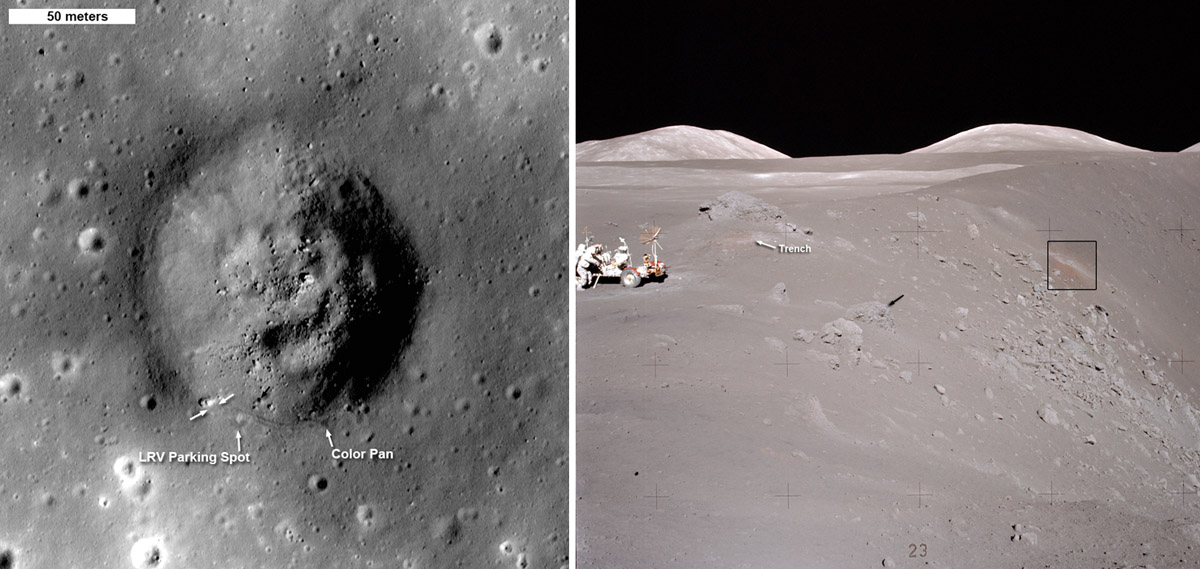Difference between revisions of "December 16, 2011"
| Line 3: | Line 3: | ||
<!-- ws:start:WikiTextHeadingRule:0:<h1> --> | <!-- ws:start:WikiTextHeadingRule:0:<h1> --> | ||
<!-- ws:start:WikiTextLocalImageRule:6:<img src="http://lpod.wikispaces.com/file/view/LPOD-Dec16-11.jpg/286706798/LPOD-Dec16-11.jpg" alt="" title="" /> -->[[File:LPOD-Dec16-11.jpg|LPOD-Dec16-11.jpg]]<!-- ws:end:WikiTextLocalImageRule:6 --><br /> | <!-- ws:start:WikiTextLocalImageRule:6:<img src="http://lpod.wikispaces.com/file/view/LPOD-Dec16-11.jpg/286706798/LPOD-Dec16-11.jpg" alt="" title="" /> -->[[File:LPOD-Dec16-11.jpg|LPOD-Dec16-11.jpg]]<!-- ws:end:WikiTextLocalImageRule:6 --><br /> | ||
| − | <em>LRO image (left) and Apollo 17 photo of Shorty Crater from [http://lroc.sese.asu.edu/news/index.php?/archives/498-Just-Another-Crater.html#extended | + | <em>LRO image (left) and Apollo 17 photo of Shorty Crater from [http://lroc.sese.asu.edu/news/index.php?/archives/498-Just-Another-Crater.html#extended LRO Featured Image] with annotations by LROC PI Mark Robinson.</em><br /> |
<em>The two white arrows</em> <em>mark the orange soil in the trench and the boulder in the Apollo image, and the words Color Pan show</em><br /> | <em>The two white arrows</em> <em>mark the orange soil in the trench and the boulder in the Apollo image, and the words Color Pan show</em><br /> | ||
<em>where the Apollo image</em> <em>was taken.</em><br /> | <em>where the Apollo image</em> <em>was taken.</em><br /> | ||
| Line 11: | Line 11: | ||
new type of explosive volcanism. Astronaut Schmitt did discover the famous orange soil at Shorty Crater that is indeed volcanic,<br /> | new type of explosive volcanism. Astronaut Schmitt did discover the famous orange soil at Shorty Crater that is indeed volcanic,<br /> | ||
the result of explosive eruptions. But Shorty isn't a volcanic crater, it is an impact crater that formed 19 million years ago, exca-<br /> | the result of explosive eruptions. But Shorty isn't a volcanic crater, it is an impact crater that formed 19 million years ago, exca-<br /> | ||
| − | vating 3.7 billion year old volcanic ash from below surface lavas. Mark Robinson has written more about these two images [http://lroc.sese.asu.edu/news/index.php?/archives/498-Just-Another-Crater.html#extended | + | vating 3.7 billion year old volcanic ash from below surface lavas. Mark Robinson has written more about these two images [http://lroc.sese.asu.edu/news/index.php?/archives/498-Just-Another-Crater.html#extended here].<br /> |
<br /> | <br /> | ||
| − | <em>[mailto:tychocrater@yahoo.com | + | <em>[mailto:tychocrater@yahoo.com Chuck Wood]</em><br /> |
<br /> | <br /> | ||
<strong>Related Links</strong><br /> | <strong>Related Links</strong><br /> | ||
Revision as of 17:43, 11 January 2015
Short Note On a Small Crater

LRO image (left) and Apollo 17 photo of Shorty Crater from LRO Featured Image with annotations by LROC PI Mark Robinson.
The two white arrows mark the orange soil in the trench and the boulder in the Apollo image, and the words Color Pan show
where the Apollo image was taken.
Shorty Crater is one of the most famous small craters on the Moon. It is a dark halo crater, and back in the days when Apollo 17
was being planned, dark halo craters were all believed to be volcanic so there was excitement that Apollo 17 would sample a
new type of explosive volcanism. Astronaut Schmitt did discover the famous orange soil at Shorty Crater that is indeed volcanic,
the result of explosive eruptions. But Shorty isn't a volcanic crater, it is an impact crater that formed 19 million years ago, exca-
vating 3.7 billion year old volcanic ash from below surface lavas. Mark Robinson has written more about these two images here.
Chuck Wood
Related Links
Rükl plate 25



